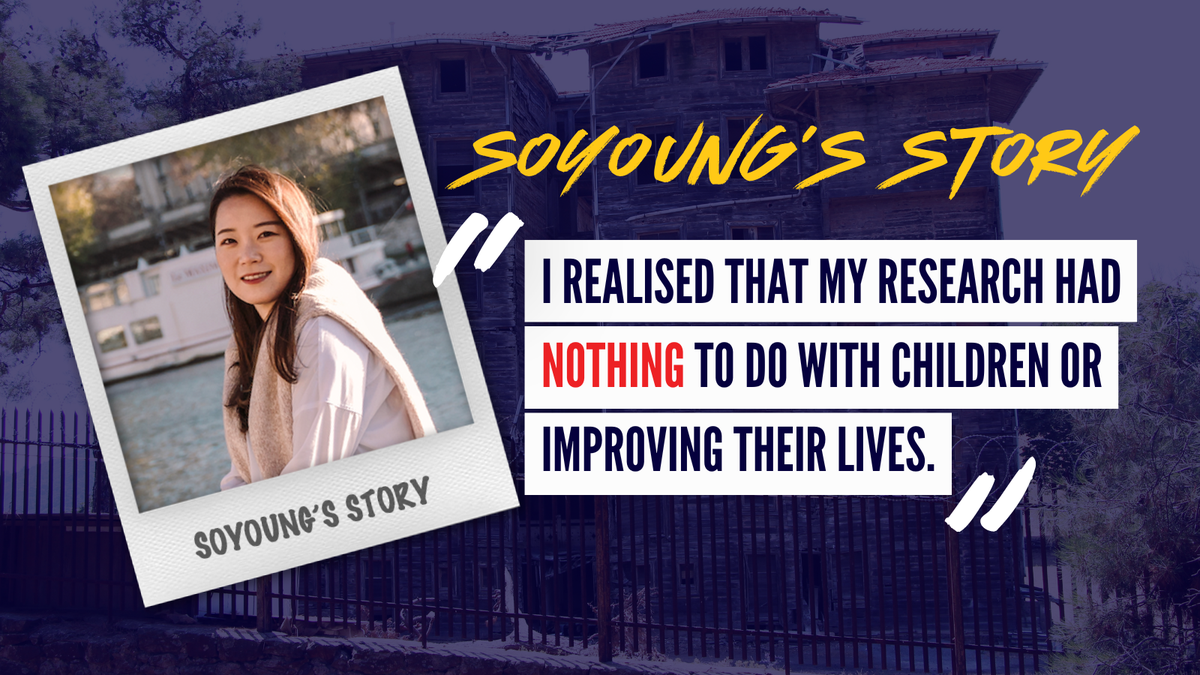Soyoung Park is a Ph.D candidate at Penn State University in the US. She explains how the little boy who said goodbye after her brief volunteering experience in an orphanage left a lasting impression that went on to shape her career.
MY FIRST VISIT TO AN ORPHANAGE
I participated in orphanage tourism in 2008. It was my second year in high school and each student had to choose a destination for an international field trip. I went to a foreign language high school where students selected one language to specialise in – mine was French.
I had two options for the field trip: France or Mongolia. I chose Mongolia. Only three out of 35 classmates chose Mongolia over France. I felt different from my other classmates who decided to participate in the French summer camp. Instead, I would be riding horses in endless plains, planting trees in a desert, and volunteering at an orphanage.
When we landed in Mongolia and started driving through the unmarked grassland, I fell head over heels. Everything was so vast, untouched and green. At night, I finally witnessed all the stars that filled our galaxy. Born and raised in one of the most populated and lighted cities, I had never seen anything like the skies and plains of Mongolia.
SEEING THINGS FIRST-HAND
After a few days of sightseeing, the day of volunteering came. We first planted some trees in the desert adjacent to the plain. Teachers and tour guides told us that students from our school planted trees every year and that they never survived. I wondered what the point of our labor was. We took a picture in front of the planted trees and headed out to our next volunteer location: an orphanage.
As soon as we entered, children gathered around us. When I saw the innocent faces of the children, I felt heartbroken. We handed out the school supplies and toys that we had brought for them.
Though we spoke different languages, we played together and quickly became ‘friends’ – or so I thought. Our teachers filmed us interacting with the children.
THE HEARTBREAK OF LEAVING
After a short playtime, we were offered lunch. I sat down with a boy who seemed about three years old and I helped him eat his food. He seemed to really like me. He would hold on to me and smile as I fed him and helped him blow his nose.
When we were done, the staff gathered the children and told them that it was nap time. The little boy came up to me and said "bye-bye". I asked why he was saying goodbye and was told: "He knows that you will be gone when he wakes up."
I broke into tears. The children were so used to this routine half-day visits of strangers that even a three-year-old understood that volunteers would be gone after nap time. I went back to Mongolia three more times since then but I never went back to that orphanage.
My memory of this heartache faded as I went off to college. When I came to the United States to pursue a Ph.D. degree in tourism, I never imagined that I would be researching orphanage tourism. My initial background lay in economics, and I wanted to specialise in tourism economics.
One day, I had to write down a life statement in class. Mine said: "To improve the lives of children through research and education."
I realised that my research had nothing to do with children or improving their lives.
LESSONS LEARNED
I started reading about children in tourism and found out that they were often dismissed and neglected as they are not decision-makers or income-generating customers. Rather, they often appeared in tourism articles as victims. The tourism industry was criticised for playing a role in trafficking children; children were also exploited for ‘sex tourism’.
Then, I came across the term "orphanage tourism" in one of the papers. A handful of studies were scrutinising the phenomenon of tourists volunteering at orphanages in less developed countries. My memory of summer 2008 rushed back.
I had not known about the children who were exploited by orphanages for monetary benefits, the children who had parents but were raised in orphanages due to poverty, nor the psychological/physical/social damages that children suffered. I started asking people around me if they knew about orphanage tourism and its detrimental effects.
Even though there had been multiple campaigns since 2010, more than 90% had never heard of the term . I browsed various social media platforms and saw a myriad of posts that shared orphanage volunteer experiences or that wished to travel abroad for such an experience. I also found student organisations on campus that were traveling to a country in Africa to participate in orphanage tourism.
Since then, I have been examining a decade worth of tweets related to orphanage volunteering and missionary trips. My research involves 1. investigating the change in sentiment toward orphanage tourism over time, 2. identifying opinion leaders and examining their message dissemination, and 3. segmenting the audience for more focused and targeted online campaigns.
Preliminary results indicate that though there was a significant decrease in the number of posts related to orphanage volunteering since 2014, there still exists a considerable amount of positive dialogue.
It was not difficult to find individuals and organisations that posted about their experiences at orphanages or promoted orphanage volunteering opportunities. Most of them were not in the reach of the orphanage tourism critics.
However, even when individuals were following the critics on Twitter, they still shared pro-orphanage tourism content. The initial findings support my assumption of existing campaigns' limited reach and influence, despite their strong messages.
Through my research, I hope to establish a strong foundation for online campaigns – such as #HelpingNotHelping – to contribute to the end of orphanage tourism and to a better world for children.



